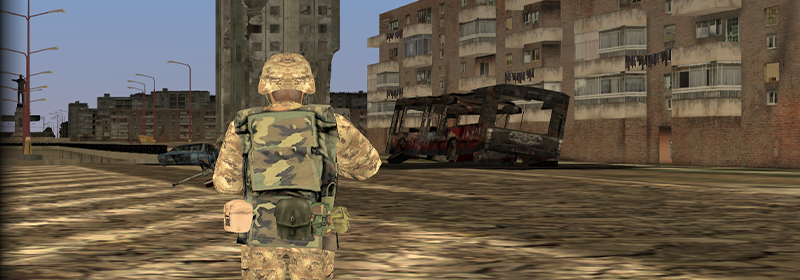- The company has developed an advanced simulator that immerses soldiers in a computer-created environment that enables training with real equipment
- The first stage is a marksmanship module for air, naval and ground forces platforms, designed to be integrated into iVictrix, the latest version of the simulator used by the Armed Forces
- This technology offers great possibilities for the development of the simulation, both for civilian and military use

In collaboration with the Spanish Army, Indra has developed an innovative simulator that will enable soldiers to train with the actual equipment they use in their missions, but immersed in a virtual environment where they can move around wearing VR goggles.
The system will be part of the iVictrix marksmanship simulator, the latest version of the Victrix simulator that is currently used by the Spanish Armed Forces on many of its bases and main training centers, and of which Indra has delivered more than 40 units.
This new system will enable training for vehicle, vessel, and aircraft gunners. The unprecedented flexibility offered by virtual reality enables a single training module to be used to train soldiers with completely different requirements.
The simulator combines the real world and the virtual world to offer soldiers a fluid experience between both environments that enhances the feeling of realism.
The soldier is placed on a platform that simulates the movements and vibrations of helicopters, vessels or vehicles as they move through the virtual world.
Soldiers hold an actual, heavy weapon in their hands, so they can feel the recoil in every shot. Through the goggles, however, soldiers see only a computer' generated version of the weapon.
Intensive use of virtual reality opens the door to a vast number of possibilities for both civilian and military training. This is one of the many lines of development for the future of simulation, and Indra is leading the way that the industry will follow.
The future of simulation
Virtual technology offers a great deal of freedom for subjects to go through a low-cost training session of an operation as many times as they need to before facing the real one.
It will accelerate, improve and increase the number of hours of training that soldiers receive before moving on to on-site maneuvers and complementary exercises, which are much more expensive and complex to organize for any army.
These systems will facilitate online training in the future, and will be available to anyone who needs it. Unnecessary travel is avoided, training is more agile, and coordination between units is strengthened.
The use of virtual reality in flight simulators will avoid having to equip each cabin with the real avionics systems on an aircraft, as is currently standard practice. It can also be used to offer training for different aircraft models using a single physical cabin.
About Indra
Indra (www.indracompany.com) is one of the leading global technology and consulting companies and the technological partner for core business operations of its customers world-wide. It is a world-leader in providing proprietary solutions in specific segments in Transport and Defense markets, and a leading firm in Digital Transformation Consultancy and Information Technologies in Spain and Latin America through its affiliate Minsait. Its business model is based on a comprehensive range of proprietary products, with an end-to-end, high-value focus and with a high innovation component. In the 2018 financial year, Indra achieved revenue of €3.104 billion, with 43,000 employees, a local presence in 46 countries and business operations in over 140 countries.